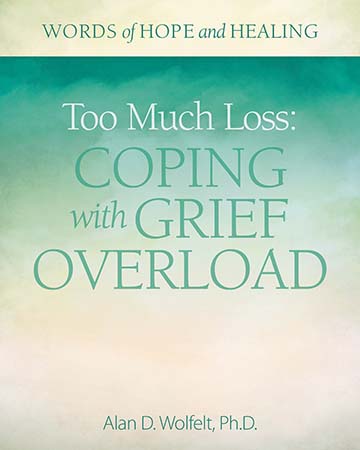Five Practical Tips to Reduce Anxiety, Calm Fear
Author: Alan Wolfelt
Editor’s note: This is an excerpt from Dr. Alan Wolfelt’s book “Too Much Loss: Coping with Grief Overload.” Although this book specifically addresses what happens when you experience multiple losses in a short period of time, these tips for dealing with fear and anxiety are useful for anyone experiencing these feelings.
Loss naturally makes us fearful because it disrupts our feelings of stability. We were enjoying a relative sense of normalcy and calm, and then wham—the foundation of our lives cracked. Multiple losses can make it feel as if several devastating, one-on-top-of-the-other earthquakes have shattered our lives, leaving the entire foundation not just shaken but obliterated altogether.
In grief overload, it’s normal to fear that something else bad will happen. After all, your life has established a pattern: this happened, then this happened, then this happened … so something else is bound to happen next, your brain thinks. You might feel always on alert, waiting for the next bit of upsetting news or the next terrible phone call.
It’s a good idea to talk to your primary-care provider about any anxiety and feelings of panic, especially if they’re pervasive or disabling in any way. Therapy, holistic techniques, and medications, when indicated, can all help. Healing in grief can’t begin until you’re feeling safe, so it’s important to address anxiety as soon as possible.

WHEN YOU’RE FEELING VERY ANXIOUS OR PANICKED
Feelings of panic or strong anxiety take over our nervous systems. When this happens, our thoughts race. So do our heartbeats. Our breathing might get faster or labored. We might get clammy or sweaty. We might even feel like we’re dying.
If you sometimes feel panicky, it’s important to develop a toolkit of strategies that help you calm yourself quickly. Here are a few suggestions:
1. Breathe deeply
Take slow, deep breaths in through your nose and out through your mouth. Inhale to a count of four then exhale to a count of four.
2. Use your touchstone
Try carrying a small object that makes you feel grounded and safe, such as a special stone, keepsake, or amulet. When you’re feeling panicked, hold it in your hand as you breathe deeply.
3. Lie down and relax your muscles
As you’re breathing deeply, lie down and intentionally focus on moving through your body, relaxing your muscles one at a time.
4. Repeat an affirmation
Breathe deeply, but instead of counting as you breathe, try repeating an affirmation that comforts you. For example, as you inhale, you could think or say aloud, “I am here,” and as you exhale, “I am safe.”
5. Go for a walk
If you’re able to, try going for a short walk whenever your anxiety builds. The movement, change of environment, and fresh air will likely clear your heart and mind and restore you to yourself.
Alan D. Wolfelt, Ph.D., is a respected author and educator on the topics of companioning others and healing in grief. He serves as Director of the Center for Loss and Life Transition and is on the faculty at the University of Colorado Medical School’s Department of Family Medicine. Dr. Wolfelt, a member of the TAPS Advisory Board, has written many best-selling books on healing in grief. Visit centerforloss.com to learn more about grief and loss and to order Dr. Wolfelt’s books.
